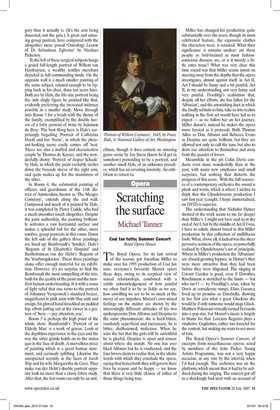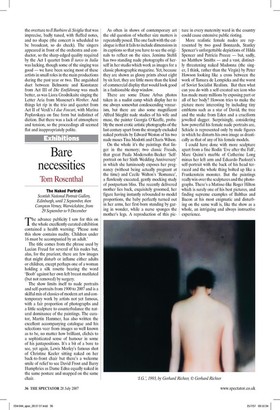Scratching the surface
Michael Tanner Cosi fan tutte; Summer Concert Royal Opera House The Royal Opera, for its last revival of the season, got Jonathan Miller to make over his 1995 production of Cosi fan tutte, everyone's favourite Mozart opera these days, owing to its sceptical view of sexual relationships, combined with a subtle acknowledgement of how painful we often find it to be as fickle as we are, how unwilling we are to be so much at the mercy of our impulses. Mozart's own mixed feelings on the matter are shown by the interestingly different attitudes of his two spokespersons Don Alfonso and Despina to the same phenomenon: she is hard-bitten, resolutely superficial and mercenary, he is bitter, disillusioned, malicious. When he wins the bet that the girls will be unfaithful he is gleeful, Despina is upset and unsure about where she stands. No one has ever liked Alfonso but he is vindicated, and the four lovers claim to realise that, in the idiotic words with which they conclude the opera, saying that henceforth they will govern their lives by reason and be happy — we know that there is very little chance of either of those things being true.
Miller has changed his production quite substantially over the years, though its most celebrated feature, the expensive clothes the characters wear, is retained. What their significance is remains unclear: are these people as bird-brained as most fashionconscious dressers are, or is it merely a little extra tease? What was very clear this time round was that Miller seems intent on steering away from the depths that the opera investigates, almost against itself, in Act II. Act I should be funny and a bit painful, Act II, in my understanding, not very funny and very painful. Fiordiligi's realisation that, despite all her efforts, she has fallen for the 'Albanian', and the astonishing duet in which she finally submits to him, take us into realms nothing in the first act would have led us to expect — as we follow her on her journey. Miller doesn't; instead he makes the opera more farcical as it proceeds. Both Thomas Allen as Don Alfonso and Rebecca Evans as Despina are quite brilliant, but they are allowed not only to call the tune but also to draw our attention to themselves and away from the quartet of lovers.
Meanwhile in the pit Colin Davis conducts even more wonderfully than in the past, with many new emphases and small surprises, but nothing that disturbs the progress of this score. With the full resources of a contemporary orchestra the sound is plush and warm, which is where I incline to think that the Glyndebourne production I saw last year (caught, I hope immortalised, on DVD) is superior.
The understanding that Nicholas Hytner showed of the work seems to me far deeper than Miller's. I might not have said so at the end of Act I; but by the middle of Act III was, I have to admit, almost bored in this Miller production by this collection of mellifluous fools. What, above all, it lacked was the sheer pervasive sexiness of the opera, so powerfully realised by Glyndebourne's set of principals. Where in Miller's production the 'Albanians' are absurd gyrating hippies, in Hytner's they were more attractive than they had been before they were disguised. The singing at Covent Garden is good, even if Dorothea Roschmann is stretched to the limits — but who isn't? — by Fiordiligi's arias, taken by Davis at considerate tempi. Elina Garanca lived up to promise as Dorabella, showing in her first aria what a great Gluckian she would be if only someone would stage Gluck. Matthew Polenzani virtually turned Ferrando into a pop star, but Mozart's music is largely to blame for that. Lorenzo Regazzo plays a vindictive Guglielmo, rather too forceful for the context, but making me want to see more of him The Royal Opera's Summer Concert, of excerpts from miscellaneous operas acted by members of the Jette Parker Young Artists Programme, was not a very happy occasion, at any rate by the interval, when I'd had enough. The orchestra was on the platform, which meant that it had to be subdued during the singing. The concert got off to a shockingly bad start with an account of the overture to Il Barbiere di Siviglia that was imprecise, badly tuned, with fluffed notes, and no shape (the concert is scheduled to be broadcast, so do check). The singers appeared in front of the orchestra and conductor, so the sharp-edged quality required by the Act I quartet from II turco in Italia was lacking, though some of the singing was good — we have been seeing most of these artists in small roles in the main productions during the past year or two. The anguished duet between Belmonte and Konstanze from Act III of Die Entfiihrung was much better, as was Liora Grodnikaite singing the Letter Aria from Massenet's Werther. And things let rip in the trio and quartet from Act II of Verdi's I due Foscari, with Marina Poplavskaya on fine form but indistinct of diction. But there was a lack of atmosphere and tension, so the proceedings all seemed flat and inappropriately polite.









































 Previous page
Previous page